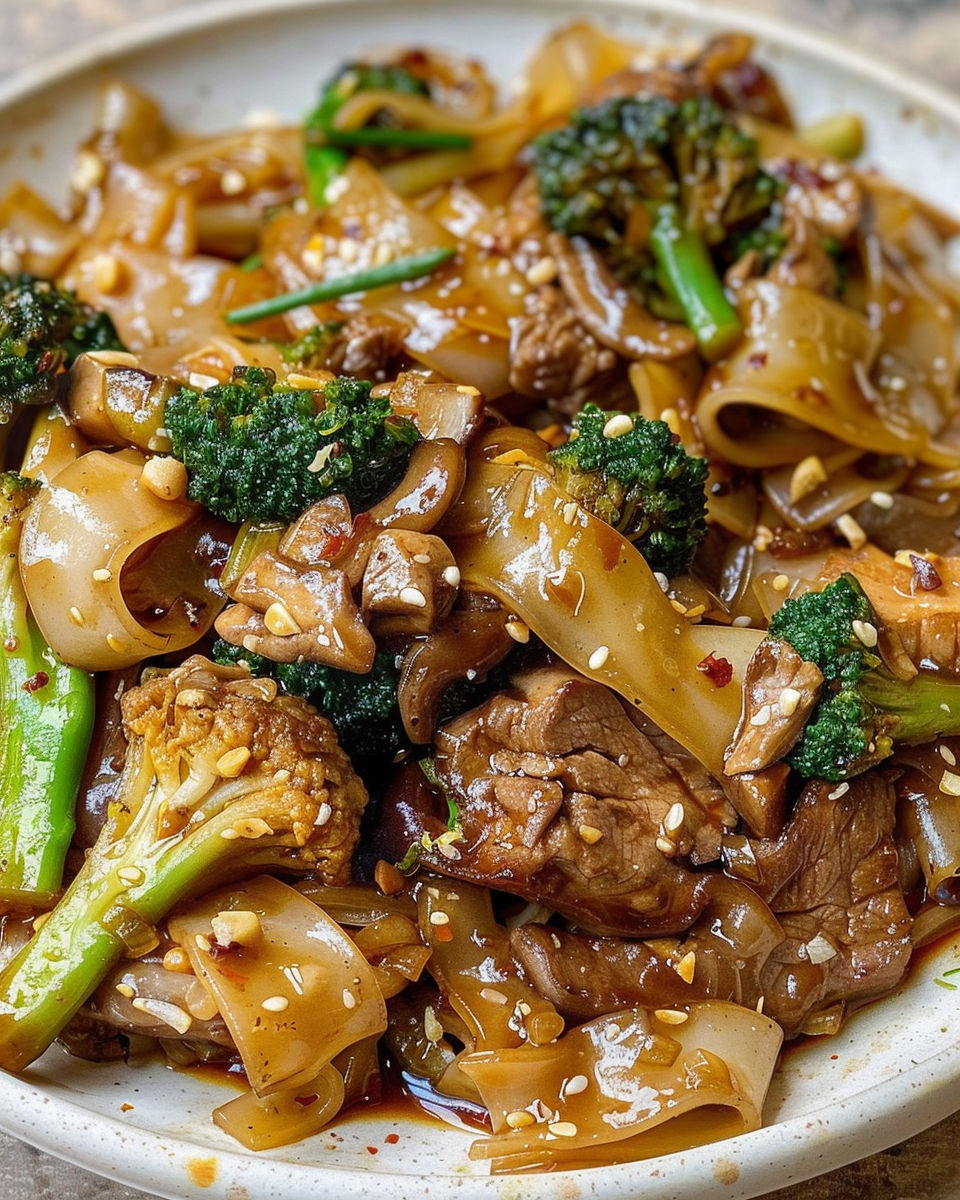 Pin
Pin
Pad See Ew (Thai Stir-Fried Soy Sauce Noodles) is the quick weeknight dinner that instantly transports my family to Bangkok with just one sizzling pan. This authentic pad see ew recipe brings crave-worthy smoky noodles and savory bites of chicken and broccoli right to your kitchen in just thirty-five minutes. With wide rice noodles, dark soy sauce, and vibrant vegetables, you get a satisfying, hearty meal that's budget friendly and easy to master, perfect for busy nights craving real Thai street food flavor.
The first time I made pad see ew at home was after a family trip to Thailand when we all missed those bold, savory street food noodles. This easy pad see ew quickly became my go-to when I want something satisfying but still healthy, that feels special and takes less than forty minutes. The noodles caramelize with a smoky aroma, every bite bursting with umami and freshness—just like our favorite Thai restaurants back in Bangkok.
Gather Your Ingredients
- Wide rice noodles for pad see ew: Essential for the classic chewy texture, use fresh noodles for authentic results, or dried soaked as instructed for flexibility; gluten free varieties work as substitutes.
- Vegetable oil: Ideal for high heat stir frying, use a neutral oil like canola or grapeseed if vegetable oil is unavailable for a clean taste.
- Garlic cloves (minced): Releases sweet aroma and creates the signature smoky flavor—use fresh garlic for best results, or substitute with jarred in a pinch.
- Large eggs: Brings creamy, rich texture and helps soak up the savory sauce; omit or use extra tofu for vegan pad see ew.
- Boneless chicken breast or beef (thinly sliced): Provides fast, even cooking and protein; tofu or mushrooms are ideal plant-based swaps.
- Chinese broccoli (gai lan): Traditional crisp green that lends earthy freshness, though regular broccoli florets are a reliable and easy substitute.
- Low sodium soy sauce: Keeps salt levels in check while delivering deep, savory taste—tamari works for gluten free needs.
- Dark soy sauce: Gives noodles their signature caramel color and depth of flavor; if unavailable, use extra regular soy sauce to achieve a similar result.
- Oyster sauce (optional): Adds restaurant style complexity; omit for vegan or use mushroom sauce as a substitute.
- Sugar: Small amount to balance the flavors and help caramelize noodles while frying; can use coconut sugar if desired.
- Freshly ground pepper: Adds gentle heat and rounds out the umami-rich sauce for authentic Thai noodle flavor.
How to Make Pad See Ew (Thai Stir-Fried Soy Sauce Noodles)
- Prepare the Noodles for Stir Fry:
- Soak wide rice noodles as directed on the package until just tender if using dried noodles, or separate fresh noodles gently for best chewy texture. Drain and set them aside. Properly prepared noodles should be soft with a bit of firmness, which helps them hold together when stir fried at high heat.
- Sauté the Protein Until Golden:
- Heat one tablespoon of vegetable oil in a large wok or nonstick skillet over medium high heat. Add thinly sliced chicken or beef in an even layer and cook for about three to four minutes, turning once, until browned and cooked through. Remove from the pan before adding vegetables, avoiding overcooking or toughness in the meat.
- Scramble the Eggs Gently:
- Add the second tablespoon of oil to the pan and crack in two large eggs. Let them sit for a few seconds, then gently scramble until softly set and creamy. Move eggs to the side of the pan to make room for the veggies in the next step.
- Stir Fry Garlic and Broccoli for Freshness:
- Add minced garlic and chopped Chinese broccoli (or regular broccoli) to the pan. Stir fry for two to three minutes until garlic is fragrant and the broccoli turns bright green and just tender, maintaining a crisp bite. Be careful not to burn the garlic to prevent bitterness.
- Add Noodles and Make the Umami Sauce:
- Add the drained noodles and return cooked meat to the pan. Pour in two tablespoons low sodium soy sauce, one tablespoon dark soy sauce, one teaspoon oyster sauce (if using), half teaspoon sugar, and several grinds of black pepper. Stir gently with two spatulas, letting noodles sit against the pan for one minute to develop caramelization and smoky depth.
- Finish and Serve the Pad See Ew:
- Continue stir frying everything for another two to three minutes until glossy, well coated, and heated through. Taste and tweak with a splash more soy sauce or sugar if you want. Serve the pad see ew piping hot, garnished with extra pepper or a squeeze of lime for bright pop and Thai restaurant flair.

One of my favorite discoveries making this pad see ew was just how smoky and deep the flavor gets when you let noodles sit on the hot wok for a few moments before tossing. My kids gather around waiting for the sizzle, and now Pad See Ew night is everyone’s favorite—a homemade twist on Bangkok street food that works for dairy free or gluten free needs with a simple swap. It’s a recipe that turns weeknights special and fits all sorts of friends and family at our table.
Smart Swaps and Variations
Pad see ew is endlessly flexible if you want to tailor it for your pantry or dietary needs. Tofu or mushrooms make an easy swap for chicken, creating a plant based option that’s just as satisfying. Use tamari or coconut aminos with gluten free noodles for a celiac safe meal, and try seasonal greens like kale or broccolini for new flavors all year. Dark soy sauce is ideal for color and smokiness, but more regular soy sauce will still work if needed.
How to Store and Reheat Pad See Ew (Thai Stir-Fried Soy Sauce Noodles)
Storing and reheating pad see ew lets you enjoy homemade Thai noodles for easy lunches or quick dinners all week long. After letting it cool to room temperature, transfer leftover noodles to airtight glass or BPA free plastic containers for up to four days in the fridge. For longer storage, divide portions into freezer safe bags or containers, removing as much air as possible to reduce freezer burn, then freeze for up to two months. To reheat, add a splash of water and gently stir fry in a pan, or microwave in short bursts, reviving the flavors without making the noodles soggy.
What to Serve with Pad See Ew (Thai Stir-Fried Soy Sauce Noodles)
Pad see ew is a complete stand-alone meal, but a crisp Thai cucumber salad or steamed jasmine rice pairs beautifully for added texture and contrast. Set out small bowls of chili flakes, pickled chilies, or fresh lime wedges so everyone can customize spiciness and tang. For an authentic Thai experience, serve with a glass of Thai iced tea or sparkling lime soda, and plate in shallow bowls for restaurant-style presentation at parties or family dinners.
Nutritional Benefits
Pad see ew delivers a healthy, balanced meal packed with lean protein from chicken and eggs, fiber (and key vitamins) from broccoli, and complex carbs from rice noodles. This recipe is free of dairy and can be gluten free and vegetarian with recipe swaps, keeping it light yet filling. Each hearty serving typically contains around six hundred eighty calories, generous protein to support energy and muscle repair, and moderate sodium if low salt soy sauce is used, making it a nutritiously sound option for family dinners.
Recipe Success Tips
To master pad see ew at home, start with a very hot wok or skillet to create caramelized, smoky noodles. Avoid overcrowding the pan, which can lead to steaming and mushy texture, and do not over soak dried rice noodles so they stay al dente when stir fried. If noodles clump together, gently loosen with two spatulas and a splash of water or soy sauce rather than forcefully stirring, so each strand retains chew and glossiness like in top Thai restaurants.

Pad See Ew brings savory, smoky Thai comfort food home in minutes and makes healthy eating fun for everyone. Try this easy Thai noodle recipe for your next weeknight dinner and see how quickly it becomes a household favorite.
Common Questions About This Recipe
- → What type of noodles work best?
Wide rice noodles are ideal for authentic texture and soaking up the savory sauces. If using dry noodles, soak until just tender.
- → Can I substitute the protein?
Chicken or beef are common, but shrimp, tofu, or even pork can be used for variety and dietary preferences.
- → How do you achieve the signature char?
Stir-fry on high heat, letting noodles sit in the hot pan a moment before tossing. This caramelizes and chars the noodles lightly.
- → Is Chinese broccoli essential?
Chinese broccoli is traditional, but regular broccoli or even bok choy can be used if needed while preserving crunch and flavor.
- → Can this dish be made vegetarian?
Simply omit the meat and use tofu. Swap oyster sauce for a vegetarian alternative or leave it out for a plant-based version.
